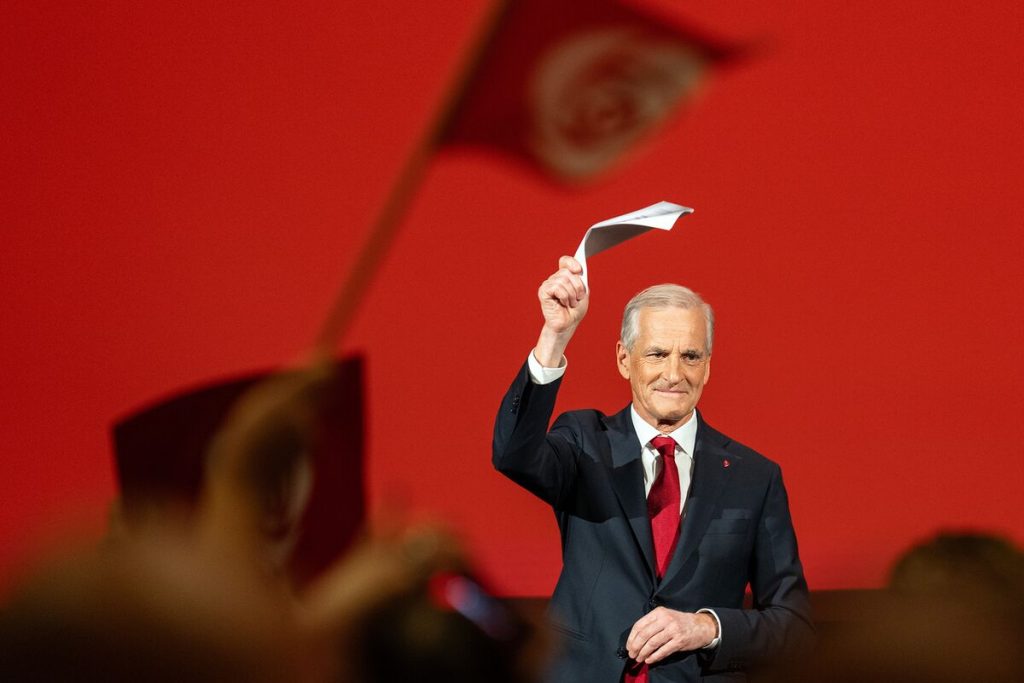NewsGate Press Network
The ruling coalition led by Labouy Party of Norway has won the re-election in the just concluded Norwegian parliamentary elections.
The Norway’s prime minister Jonas Gahr Støre has re-secured his position despite strong advances by the right-wing populist Progress Party.
Within hours of the declaration of results the Prime Minister Narendra Modi in a message on social media congratulated Jonas Gahr.
In a post on X, Modi said:
“Congratulations to Prime Minister Jonas Gahr Støre on his re-election. I look forward to continue working closely together to further strengthen the India-Norway partnership in all areas”.
The outcome maintains the centre-left coalition in power, but signals an increasingly polarized political landscape.
Labour Holds On to Power
With nearly all votes tallied, the Labour-led red-green coalition has secured 88 seats in the 169-member Storting, narrowly exceeding the 85-seat majority threshold. The Progress Party, under the leadership of Sylvi Listhaug, doubled its representation, becoming the largest opposition force.
The Progress Party led coalition secured 81 seats slightly below the majority threshold. Meanwhile, the Conservative Party, led by former Prime Minister Erna Solberg, fell to third place, recording its lowest support in more than a decade.
The Labour Party (Ap) slightly increased its seats to 53, retaining its position as the largest party, while the right-wing Progress Party (FrP) surged dramatically from 21 to 47 seats, becoming the main opposition.
The Conservative Party (H) fell to 24 seats down from 36 seats, dropping to third place.
The Green Party (MDG) doubled its representation to 8 seats, and the Red Party (Rødt) grew modestly to 9 seats, strengthening the far-left. The Centre Party (Sp) suffered a substantial setback, dropping from 28 seats to 9 seats, a significant loss of support.
The Christian Democrats (KrF) made significant gains, increasing their seats from 3 to 7, strengthening their presence in parliament. In contrast, the Liberal Party (Venstre) suffered a major setback, falling from 8 to 3 seats, losing several prominent members and marking their worst performance in decades.
Overall, the results reflect gains for populist and environmental parties, slight growth for Labour, and setbacks for traditional centre-right parties.
Polarization Drives Campaign
The election campaign was marked by heated debates on cost-of-living pressures, taxation, and Norway’s energy investments abroad, particularly in Israel.
Analysts noted the rise of the Progress Party reflects a broader European trend of right-wing populism, capturing voter frustrations over immigration, taxes, and perceived elite governance.
Greens Gain Influence
Another key development was the strengthened position of the Green Party, which increased its parliamentary seats to eight after securing 4.7% of the vote. The party’s platform calls for a gradual cessation of new oil and gas exploration, aiming for a full transition away from fossil fuels by 2040.
This places the Labour-led government in a delicate position, as it balances its support for continued oil extraction with the Greens’ environmental priorities.
Economic and Energy Policy Implications
Norway’s energy sector, a cornerstone of its economy, faces pressure from both declining production forecasts and rising calls for sustainable energy transitions. Analysts estimate that a full implementation of the Green Party’s proposals could reduce oil-related government revenue by billions of dollars annually, intensifying the challenge for the Støre administration to reconcile economic and environmental objectives.
The Labour-Green coalition now faces the task of governing with a significantly strengthened opposition and negotiating internal policy differences on energy and climate issues.
The upcoming term is expected to focus on addressing economic inequality, healthcare reforms, and the nation’s role in an increasingly complex international environment, while navigating the tensions arising from Norway’s shifting energy policy landscape.
Norway’s election results signal a more polarized parliament, with Labour clinging to power while populists, environmentalists, and left-wing parties reshape the political landscape, leaving the government to navigate a delicate balance between economic stability, climate action, and social equity.
Following Norway’s 2025 elections, Prime Minister Støre’s re-election ensures continuity in the country’s foreign and economic policies, paving the way for strengthened India-Norway ties.
Both nations are expected to deepen cooperation in trade, green technologies, maritime sectors, and renewable energy, leveraging Norway’s expertise and India’s growing market to drive sustainable development and mutual economic growth.
(Special inputs by Arulrajadurai D)


Comments are closed for this post.